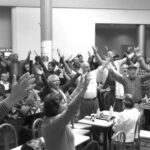The tiny island nation of Singapore was brought to colorful life on the big screen this summer with the hit movie Crazy Rich Asians. For a film about the absurd opulence of some “crazy rich” families in Asia, Singapore makes the perfect setting. The famously modern and affluent city—the world’s most expensive for the fifth year running—is on vivid display in the film, from the over-the-top spaceship architecture of the Marina Bay Sands Hotel to the ridiculously nice Changi Airport (routinely voted the world’s best) to the colonial luxury of the Raffles Hotel.
An early scene shows a group of wealthy Singaporean women having a Bible study on Ephesians inside a posh mansion. The dichotomous scene plays for laughs, but it captures one of the unique contours of Christianity in Singapore—a nation where affluence and piety often coexist, for good and for ill.
Once a vulnerable and dubiously viable Third World island, Singapore quickly transformed itself into a First World nation with one of the highest per-capita GDPs in the world. Though it faces some of the same challenges as any developed nation (high income inequality, poverty, burdensome cost of living), Singapore is consistently one of the most competitive, affluent, and well-governed countries in the world. But this remarkable feat of nation-building—no doubt a result of the determination and industriousness of its people—has come with certain attitudes that can make it hard for the gospel to take root: self-reliance, pragmatism, and materialism, to name a few.
I asked three pastors in Singapore—Simon Murphy of Redemption Hill, Guna Raman of Agape Baptist Church, and Huai Tze Tan of One Covenant Church—about these and other challenges they face preaching the gospel and making disciples in Singapore. Here’s an edited transcript of what they told me.
What should TGC readers know about Christianity in Singapore?
Murphy: Christianity is very visible in Singapore: there are many churches, and churches play a fairly active role in the community. While the percentage of Christians is growing, it is still small, and there are many who do not know Jesus. While most churches earnestly strive to preach the Word and display the love of Christ, the gospel is merely assumed in some churches, and the way it intersects with one’s life and circumstances is not clearly grasped. This disconnect easily leads to Christianity being seen as either a moralistic religion, where the approval of God needs to and can be earned, or as a contract between God and man, where faith and/or works results in security and prosperity.
Nevertheless, God is active here in Singapore, drawing unbelievers and giving Christians a deeper longing for himself. We see this in a growing number of conversions and churches, and in a vibrant Christian presence in the community.
Raman: On the surface, Singapore looks like a nation that is well “Christianized,” with more than 800 churches in a small island (278 square miles) of 5.8 million people. But while Christianity here can appear robust and strong—with several high-profile megachurches that have gained international fame and recognition—much of it is theologically weak and shallow. Many churches preach heavily moralistic sermons or, on the other hand, proclaim “hyper-grace,” subtly (if not overtly) proclaiming the prosperity gospel. There is a great need in Singapore for more theological depth.
There is a great need in Singapore for more theological depth.
Tan: Singapore was a former British colony. Hence, the lingua franca here is English, and Christianity arrived here early on with the British colonialists. More than 18 percent of Singapore residents identify as Christian, of which 7 percent are Roman Catholic, and 11.8 percent chiefly Protestant, with a small number of Eastern Orthodox Christians.
Describe your churches.
Tan: One Covenant Church is a new church plant meeting at Redhill in Singapore, supported by Mission to the World (MTW) and Redeemer City to City. We launched public worship in April 2017 and currently average around 40 adults and 10 children on Sunday mornings. We have singles, young families, professionals, and students. We seem to have some traction among those who had left church and even the faith and are finding their way back to God, as well as among non-believing friends of our members, Singaporeans who have come back from overseas, and internationals who have moved to Singapore.
We seek to be a winsome, humble, and credible witness of the gospel in Singapore to the skeptic, seeker, and saint. We are confessional, subscribing to the ancient Christian creeds and the Westminster Standards. We are connectional, believing that churches should work together for mutual accountability, encouragement, and mission. And we are commissional, believing that God has commissioned the church to proclaim the gospel and engage the culture.
Murphy: Our church, Redemption Hill, will turn 10 in November. Across our three congregations, we average between 1,000 to 1,100 people on Sundays. We are located in Chinatown, in the heart of the city. Our congregation is healthy mix of locals and internationals. Our average age is fairly young (28 years) and made up mostly of students and professionals. We have a good proportion of singles and families.
Those who have come through our doors seem to have a real hunger for deep, soul-satisfying knowledge of God. They are not content with Christian platitudes or a light understanding of God. There is a passion and desire for God’s Word (both read and preached), as well as for gospel explicitness and applicability. We strive to apply the gospel to all aspects of life, and to help members form deep, intentional, gospel-centered relationships with one another. As a church that holds to “city renewal” as one of our values, we long to see the proliferation of the gospel in our city, and for the city to be renewed culturally, socially, and spiritually for the glory of God. This means we actively pursue mercy and justice and integrating our faith with our work.
Raman: I have pastored Agape Baptist Church, the church I planted, for the last 29 years. We have two campuses: OneDorset and OneFarrer. Four years ago, the church at OneDorset planted a new congregation, which is now at OneFarrer, primarily to attract young professionals seeking God. The OneDorset congregation is active in serving the immediate community just behind the church, with 21 blocks of high-rise apartments, making up around 2,100 household units with about 10,000 people. For years the church has been active in bridging the gap between church and community through works of justice and mercy to win the heart of the community and win a hearing for the gospel.
One of the key milestones for our church was when I made a fresh discovery of the power and centrality of the gospel in 2010, through the books of Tim Keller. That discovery led the church on a gospel journey that has been rather amazing, bringing about changes that have been transformational to the life of the church in every possible aspect, from ministry design to gospel-centered preaching.
How does the unique culture and history of Singapore influence the shape of Christianity there?
Raman: Singapore has become very affluent in the last 30 years, largely due to the government’s pragmatic thinking. By and large, Singaporeans don’t care for what is of intrinsic value as opposed to what works and can bring in more money, more success, more comfort, and more convenience. This approach has spilled into the church. Churches in Singapore tend toward the easy and comfortable life. The nation has not seen a major catastrophe (except for SARS for a brief period in 2003) or a major economic downturn. As result, many Christians here are averse to suffering. Many believe God is a god of love but not of wrath. There is little understanding of the doctrine of sin and, therefore, little appreciation for the work of the cross and the grace that comes to us from the finished work of Christ. Christians are often more interested in a god of healing and a god of blessing than the God of the Bible.
Christians here are often more interested in a god of healing and a god of blessing than the God of the Bible.
Murphy: Singapore is a multi-ethnic and multi-religious society. The harmony that exists among different races and religions is zealously guarded and ardently protected (both by the government and also by society itself). For many, Singapore is a shining example for the world of multiculturalism at its best. While this means there is a need to be extremely aware of religious sensitivities in the city’s context, the tolerance for other religions actually forces a generosity of spirit and charity that is helpful as others seek to understand Christianity (and other religions). It is an environment of respect and cooperation. The downside is that the insistence on truth can, without proper dialogue, make Christianity seem intolerant, exclusive, and even detrimental to society.
As with most other Asian countries, Singapore puts great value on the family unit. Individualism is often expected to cede to family honor, reputation, and harmony. Many—especially the older generation—view filial piety and conformity as the paramount expression of love for one’s elders. In addition, ethnicity is closely tied to the expression of the family unit (e.g. “We are Chinese, therefore we think/act in a certain way”). This can cause challenges for a Christian with unbelieving parents or a Christian trying to live by countercultural biblical principles. Also, because Christianity came to Singapore through foreign missionaries of colonial powers, Christianity can still be perceived as a Western religion that is fundamentally incompatible with ethnic identity.
Because Christianity came to Singapore through foreign missionaries of colonial powers, Christianity can still be perceived as a Western religion that is fundamentally incompatible with ethnic identity.
Tan: Singapore is the third-most-densely populated country in the world. It is a highly educated, sophisticated, and pluralistic society, strategically located on the crossroads between East and West. Its world-class airport provides access to key cities in the Asia Pacific (e.g., Kuala Lumpur, Jakarta, Bangkok, Hong Kong, Taiwan, New Delhi, Perth, Shanghai, and Tokyo) and to 2.8 billion people within a seven-hour flight radius.
If there were three words that could summarize Singapore culture it would be pluralistic, pragmatic, and secular. Pluralistic because of the nation’s multiculturalism. Pragmatic because the founding father of modern Singapore, Cambridge-educated lawyer Lee Kuan Yew, was not given to ideals but rather built a society based on what was practical. And although all major religions are represented here, statistics show a growing trend of secularism in Singapore, with a sizable 18.5 percent of the population identifying as having “no religion.” The reasons noted for shunning religion included a perception that religion did not connect with their lifestyle and needs, and that religious institutions were ideologically regressive and slow to engage young people. Notably, respondents also cited how high-profile scandals involving religious leaders had compromised the credibility of religious groups as a moral voice.
If there were three words that could summarize Singapore culture it would be pluralistic, pragmatic, and secular.
Although this is painting in broad strokes, Christian attitudes here tend to be more pragmatic than doctrinal. Oftentimes, it is what works, rather than what is true, that is of greatest concern. Also, because of our multi-religious society and sensitivities toward proselytizing, churches tend to go for the “lowest common denominator” and are wary of emphasizing doctrinal distinctives.
What are the biggest discipleship challenges you face in the Singapore context?
Murphy: Meritocracy is a deeply held and revered value, long considered integral to its success and development. Singaporeans constantly feel assessed by their performance, and there is a prevailing mindset that people deserve the outcomes they’ve been dealt. Further, the society is incredibly competitive, and the cost of living is high. It’s easy for Christianity to be received only insofar as it does not impinge on these mundane realities in people’s lives. Faith becomes a challenge as people feel God is irrelevant or inconvenient when the pressures of life become real.
Tan: People work incredibly hard and are incredibly busy. Hence, many struggle to make time for church. Christians also sense a disconnect between what they hear in church and how it connects to their daily lives: family, work, relationships, and so on.
Raman: Singaporeans are very busy. Many travel globally in their jobs. Kids face tremendous pressure at school from a young age. Many Christians do not have the time needed for discipleship. Many do not have a regular devotional life (leading us at Agape to run a closely monitored daily Bible reading program), and they tend to pray on the run.
What idols are most insidious in the Singapore context?
Tan: Pragmatism. It is built into our education system and into the general approach we take. It is a self-confidence in being able to work things out by ourselves. Another is materialism, where people have little time and space to reflect on meaning, purpose, and existence, and are much more preoccupied with the here and now.
Murphy: First, the idol of material affluence, rooted in the need to build and maintain a certain image/reputation/lifestyle and not fall behind in a high-pressure society that assesses worth based on achievements. The implication is that the prosperity gospel is appealing to many. Second, legalism is also deeply rooted in Singapore given the practice of meritocracy, as described above. Receiving grace and extending it therefore becomes extremely counterintuitive, countercultural, and even offensive in a culture that places so much emphasis on the idea that only the deserving are rewarded. Accordingly, Christianity has been widely understood to be moralistic. While the gospel may be expressed and understood at the point of salvation, it can often become redundant thereafter. As there is a weak grasp on how the gospel applies to the rest of the Christian life, sanctification and discipleship tend to slip into legalism, where one becomes acceptable to God by works/service/behavior.
Raman: First, comfort. Singaporeans are not prepared to suffer, and Singaporean Christians are not prepared to suffer persecution. Many want a faith that is comfortable, a life that is easy, and a God who only brings good into their lives. Second, approval. In Singapore there is a desire to be the best in everything, from our seaport to airport to education system to smart-city pride. Singaporeans often crave recognition and success at all cost (for them and their children) and often feel great shame when they fail. Christians, then, can feel like God is punishing them when tragedy hits their lives.
What aspect of the gospel have you found most connects with Singaporeans?
Raman: The truth that we are accepted by God not on the basis of what we have done right, but on what Christ has done right, is liberating. The message of grace is empowering. Christians here need to find rest in Christ and not strive harder and harder to win God’s approval and blessing. The gospel provides that rest.
Christians here need to find rest in Christ and not strive harder and harder to win God’s approval and blessing. The gospel provides that rest.
Tan: There is a yearning and hunger for deep and meaningful relationships, and for family. Because of Singapore’s pragmatism, many are left existentially and relationally cold. The gospel’s promise that God makes us his own children and puts us into families, we have found to be appealing to non-Christians.
Murphy: In the context of a high-pressure society, love and affirmation can often seem to be tied to performance. In light of this, when the gospel is presented in a way that the unconditional love and tenderness of the Father is made manifest, it is often received well, as it taps into a yearning for affirmation that is not performance-based. So while salvation by grace alone may seem like an “obstacle” due to the prevailing culture, the fact that it’s countercultural can work to its advantage. It is a radically refreshing message in a society prone to assessing people’s worth based on their résumé.
Also in this series:
Involved in Women’s Ministry? Add This to Your Discipleship Tool Kit.
 We need one another. Yet we don’t always know how to develop deep relationships to help us grow in the Christian life. Younger believers benefit from the guidance and wisdom of more mature saints as their faith deepens. But too often, potential mentors lack clarity and training on how to engage in discipling those they can influence.
We need one another. Yet we don’t always know how to develop deep relationships to help us grow in the Christian life. Younger believers benefit from the guidance and wisdom of more mature saints as their faith deepens. But too often, potential mentors lack clarity and training on how to engage in discipling those they can influence.
Whether you’re longing to find a spiritual mentor or hoping to serve as a guide for someone else, we have a FREE resource to encourage and equip you. In Growing Together: Taking Mentoring Beyond Small Talk and Prayer Requests, Melissa Kruger, TGC’s vice president of discipleship programming, offers encouraging lessons to guide conversations that promote spiritual growth in both the mentee and mentor.

































